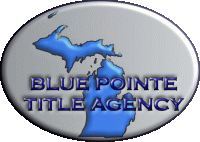How Much Money Should You Save To Put Down On Your First Home?
- Blue Pointe Title
- May 11, 2023
- 3 min read
Updated: Oct 15, 2025

If you decide to take out a mortgage when you buy a home, then you are going to have to put down some money. Lenders see this as your way of contributing to the purchase of the property - as they take care of the rest.
This money is referred to as a down payment.
Knowing just how much money you should save to put down on your first home is important for planning ahead. So, let’s talk about it.
How Much is Needed for a Down Payment?
On average, you can expect that a down payment for a home will be anywhere from 10% to 20-25% of the purchase price. This means if you are borrowing $100,000 from a lender, you will pay at least $10,000 - and the loan you receive will be for $90,000.
There are many different types of loans that will each have different requirements - especially if you meet certain criteria. Because of this, it is impossible to know exactly how much is needed for a down payment.
First-Time Homebuyer Loan Programs
Some good news for first-time homebuyers is that there are loan programs available that require little or no down payment. This can make it easier to make that purchase. For instance, if you are purchasing that $100,000 property discussed above, you may be able to secure a loan as a first-time homebuyer with only 3% - or $3,000 - down.
A few of the most popular first-time homeowner loan programs are:
Conventional Loans. Conventional loans may require as little as 3% down, as long as you have a high enough credit score. The requirements of these loans will vary based on the lender.
FHA Loans. FHA loans are those that are issued by the government. They have fewer requirements for qualifications and may only ask for 3.5% down.
USDA Loans. USDA loans are great for those first-time homebuyers who are purchasing in a specific rural area - or who have lower income. These loans often don’t require any down payment.
VA Loans. VA loans are for those borrowers who are currently on active duty in the military, as well as veterans and their immediate family members. These, too, don’t require a down payment.
Other assistance for first-time homebuyers can come in the form of grants, deferred payment loans, and forgivable loans. Be sure to do your research and find the one that best meets your needs.
Advantages of Having a Smaller Down Payment
It is no surprise that qualifying for a loan with a smaller down payment requirement may get you into your home faster. Though building up your down payment can be highly beneficial. After all, the sooner you get into your house, the sooner you can begin building equity.
As a first-time homeowner, you are going to learn quickly that maintaining a home is so important. Anytime repairs need to be made, you are the one responsible for seeing that they get done. Using less money for your down payment will allow you to have money set aside for these things when they arise.
What’s more, having an emergency fund set aside is helpful in case something unexpected happens. It can help you to stay on top of your mortgage payments.
Close on Your First Home with Blue Pointe Title
Buying your first home is exciting, but going through the process can be confusing, too. Knowing that you are working with a team of title experts, however, can help you move confidently through the process.
At Blue Pointe Title, we answer any questions you may have and explain each step along the way. To learn more about what we have to offer - or to get started, contact us today at (517) 258-1511.






Comments